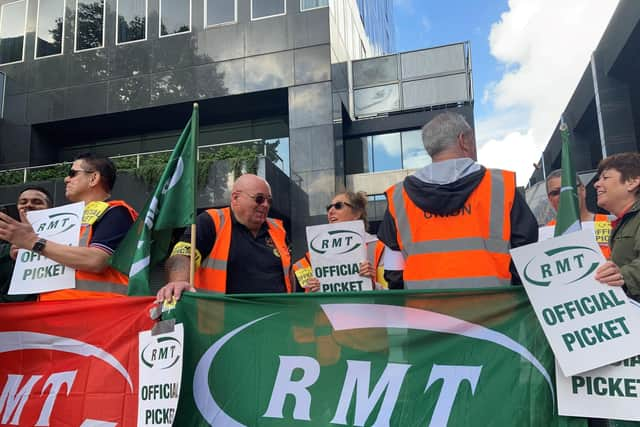Rail strikes 2022: Further strike action not ruled out as fresh strike crippled train services
and live on Freeview channel 276
Members of the Rail, Maritime and Transport (RMT) union walked out on Saturday for the third time this week, with little sign of a breakthrough in discussions between the union and rail operators.
Only a fifth of services are running and half of the lines are closed. Passengers have been warned by rail operators that they should only travel by train if necessary and to check their journey in advance.
Advertisement
Hide AdAdvertisement
Hide AdMick Lynch said the union has not ruled out further strikes given there is little sign of a breakthrough to the deadlocked row.


His comments came as he joined workers on a picket line outside Euston Station in central London on Saturday morning.
Speaking to the PA news agency, he said: “We’re not ruling out strikes but we have not put down any dates for any strike action.
“We’re going to review with our national executive next week, who have been all the way round the country this week on the picket line, so we’re all going to get together the leadership of the union and see where we are.
Advertisement
Hide AdAdvertisement
Hide Ad“We are not going to name dates immediately and we’re going to continue working constructively with the companies to strike a deal, but that is a really steep challenge at the moment because of the agenda they’ve got and the effects they want on our members.
“Strike action’s not ruled out and it will have to take place if we do not get a deal, but we’re hoping that we can get a deal and we get some compromise.
“What we try to do is have the most effective strike action if it needs to take place. We’re not just pretending. It’s got to be a coherent and effective strike action because we don’t want to waste our members’ energy on something that doesn’t work. We’ll review that and see what we need to do if we need to take that action.”
Mr Lynch also hit out at the Government, saying many ministers have “never done a hand’s turn”.
Advertisement
Hide AdAdvertisement
Hide AdHe said: “They’re not using the system that they want and they’ve never worked in this type of work.
“Many of them have never run a business, but they’ve also never worked on the tools. As my mother would say, they’ve never done a hand’s turn.
“It’s quite odd. The people who are running this country are brought up on a diet of Latin and Greek and our members are brought up on a diet of getting up at ungodly times to run the transport system. I think there’s a bit of disconnect there.
“If we had people who were used to doing work we might get a better deal out of them.”
Advertisement
Hide AdAdvertisement
Hide AdIt comes after Prime Minister Boris Johnson said the public has a right to expect reforms to rail services.
He told Sky News: “I would say, given the circumstances we’re in, I think what we want to see is reform and improvement in the way the railways work, and modernisation.
“When you’ve got a 25% fall in ridership, which we’ve got at the moment, we’ve got the Government putting billions and billion (into it).
“We’re putting more into the railways than any previous government.
Advertisement
Hide AdAdvertisement
Hide Ad“I think the travelling public has a right to expect some basic reforms, like with ticket offices, like with walking time, and some of these other practices that really nobody defends except the union leaders.”
Prime Minister Boris Johnson said the public has a right to expect reforms to rail services.
He told Sky News: “I would say, given the circumstances we’re in, I think what we want to see is reform and improvement in the way the railways work, and modernisation.
“When you’ve got a 25% fall in ridership, which we’ve got at the moment, we’ve got the Government putting billions and billion (into it).
Advertisement
Hide AdAdvertisement
Hide Ad“We’re putting more into the railways than any previous government.
“I think the travelling public has a right to expect some basic reforms, like with ticket offices, like with walking time, and some of these other practices that really nobody defends except the union leaders.”
In a series of tweets, Transport Secretary Grant Shapps said: “Our railway is a proud part of our history and has served us well for 200 years, but if we want it to serve us for the next 200 then it must move with the times and banish the outdated working practices that are holding it back.
“For instance, did you know, Sunday working laws haven’t been updated since 1919. That means, for some Train Operating Companies, Sundays aren’t part of the working week and they have to rely on the ‘good will’ of employees to work them – while receiving substantial overtime pay!”
Advertisement
Hide AdAdvertisement
Hide AdMr Shapps also criticised “maintenance laws”, saying: “The rostering of individuals or training of multiskilled workers isn’t allowed. It means for a job that could, in theory, be completed by one person, whole teams have to be sent. Even worse, these teams won’t share vans or equipment either.
“Not only that but maintenance teams aren’t allowed to cross one geographical boundary to another, even neighbouring ones to carry out vital repairs. It means a team based at Euston wouldn’t be able to walk 500 yards to Kings Cross to fix an urgent points failure.
“Practices such as this aren’t just archaic, they are hugely damaging to commuters’ daily lives and the economy, causing people to be late for work or miss hospital appointments and, as an industry, we must change.”
